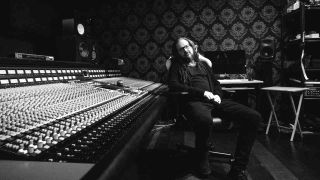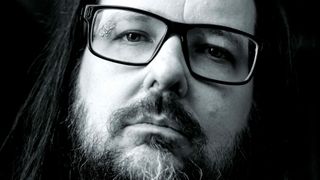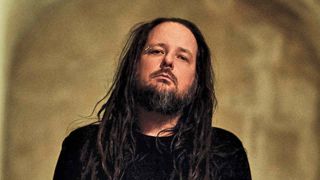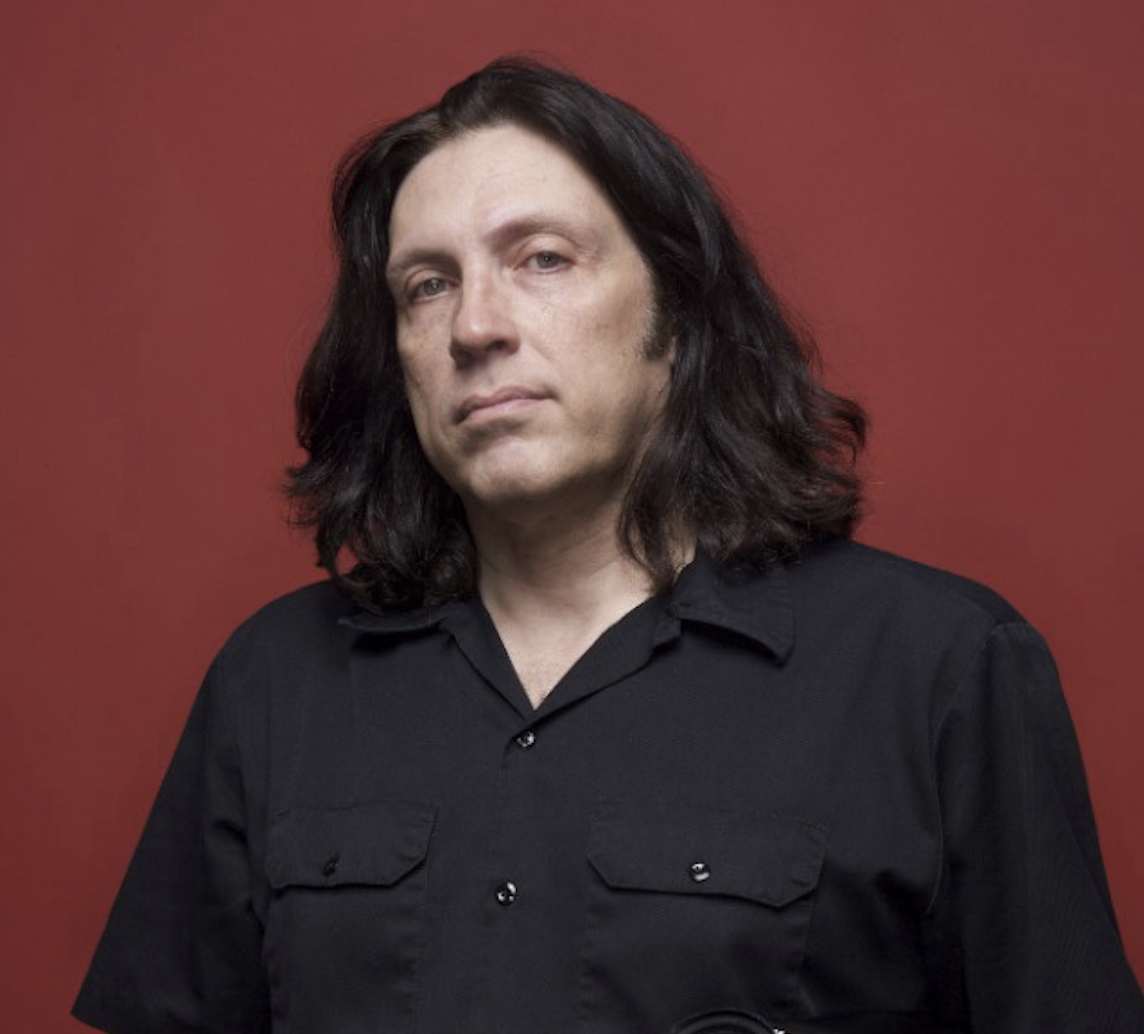Vampire genius or awkward recluse? As Korn frontman Jonathan Davis unveiled his debut solo album, Black Labyrinth, in 2018, he invited Metal Hammer to his hometown studio in Bakersfield for a captivating afternoon with the nu metal legend.
Jonathan Davis still lives like a vampire. He prowls the hallways of his recording studio on the lonely edge of Bakersfield, California, obsessively making music and playing videogames deep into the night. “The later it gets, the more I come to life,” the Korn singer says with a laugh. There’s a trampoline and treadmill, Nerf guns and old DVDs of US country music variety show Hee Haw to pass the hours. And then every afternoon, he wakes just in time to pick up his boys from school.
He still calls the place Buck Owens Studios, named for the late country music star and 60s hit-maker whose Bakersfield Sound was a grittier alternative to the gloss of Nashville. Buck built this studio in an old movie theatre, where the marquee now sits empty and a metal gate bars neighbourhood speed freaks from the front door. Merle Haggard and Johnny Cash recorded here, and Jonathan’s musician father ran the place for decades.
So when the frontman took it over in 2010, he decorated it with Korn’s platinum records and vintage paintings of Buck in embroidered country-and-western finery. “I don’t want to fuck with it. It’s perfect,” he says, black hair to his shoulders, a touch of grey in his beard. “The stains on the wall and everything about it has a vibe. I don’t want it all slick and nice.”
Just yesterday, Korn finished a week at the studio working on new music, and the place looks lived in. Ray Luzier’s drumkit is still set up in the main room, where a basketball hoop stands tall beside a big-screen TV and scattered amps and guitars. These are good times for the band, preparing to follow up 2016’s well-received The Serenity Of Suffering.
“I’m trying to push them in a more groove-oriented way,” says Jonathan excitedly, sitting at the computer where he spends hours each night labouring over his songs-in-progress. “I miss the head-bobbing. Where the heck did that go, dude? Everybody’s getting that back: ‘Fuck yeah!’ We’re all screaming and having fun like we’re 21 again.”
At just after 3pm, it’s still a little early for Jonathan to be awake, but he’s a friendly and chatty host this afternoon. He’s more family man than party animal these days, entirely free from drink and drugs, or even the prescription ‘Benzos’ that used to keep his anxiety in check. In Bakersfield, Jonathan doesn’t get out much, but does enjoy spotting the occasional ‘tweaker’ or skinhead standing beside a barrel fire or mowing his lawn in the middle of the night.
“This is the weirdest place on Earth to me,” he says with genuine affection. “It’s like watching a David Lynch film.”

But Jonathan is a vampire who now prefers to stay indoors, and can be found most days almost exclusively at the studio or at home with his family, including his sons Pirate, 13, and Zeppelin, 11, who was diagnosed with diabetes in 2014. His oldest son, Nathan, 22, is part of the electronic duo Hi I’m Ghost, who are signed to Firepower Records, and he looks like a younger clone of his dad in glasses and moustache, dressed head to toe in midnight black.
“I’ve got music and my family. They’ve got to co-exist together. One’s not more important than the other,” he insists. He then adds with a laugh, “If it was my son or music, I would choose my son! But there are sacrifices. I’m always gone and on the road.”
In a few weeks, Jonathan will be leaving the wife and kids behind as he embarks on a long-awaited side-step from Korn, hitting the road in connection with the release of his first true solo album, Black Labyrinth. He recorded 25 songs for the project over several years, then edited them down to a final 13, sounding less like Korn than a different brand of eclectic hard rock layered with tabla beats, violin and other acoustic instruments.
For him, it has been a chance to stretch out musically, not undermine the renewed momentum of his band. “If I want to do a Korn song, I’ll do it with Korn!” he says. “I’m not going to write a Korn song on my solo shit. This is this side of me.”
He first explored another side of his creative self on his 2002 movie soundtrack for Queen Of The Damned. The songs and orchestral score (recorded by a 110-piece orchestra) were written with Richard Gibbs for the Anne Rice vampire film and was his first ever project outside the band. It was inspired, he says now, by “just thinking of what would a fuckin’ 600-year-old vampire’s rock band sound like? It just came naturally to me.”
That project opened up a musical palate that he explored further on his next solo experiment, Alone I Play, a live performance recorded at the Woodshed Recorder studio in Malibu in 2007, followed by his first solo tour. He wore gangster pinstripes on that tour and left the bagpipes and tracksuit at home. It seemed like the beginning of a separate identity for the singer, and there were various side-projects along the way: guest vocals on tracks with Tech N9ne and Bone Thugs, remixing Rob Zombie and Steve Aoki as his EDM alter-ego JDevil, an album as part of a dubstep trio called Killbot.
But it took a full decade for his first studio solo album to come together. For many of those years, he was discouraged from pursuing it by Korn’s former management and other concerned citizens. Even so, he worked on his own music anyway, privately building on what he began with Alone I Play. The songs that came from it were danceable and sweeping, world beats and 80s synths colliding, even as the lyrics remained obsessed with his eternal subjects of alienation and emotional conflict.
The first single from Black Labyrinth is What It Is, a melodrama of piano and slabs of guitar, as Jonathan rages: ‘It may seem impossible / But I will embrace who I really am / If it’s a son of a bitch or a terrified kid.’ Written originally for the film American Satan, the song is the album’s most straight-ahead track, while the exotic and subversively pretty Gender bounces with tabla beats and lyrics inspired by the serial killer Buffalo Bill from Silence Of The Lambs: ‘Can I wear your skin? Can I have it now?’
Also on the album is Medicate, delivering some NIN-style intensity as Jonathan reflects on his days tweaked on Xanax: ‘I can see my flaws plain as day.’ Of that time, Jonathan recalls now, “I was a slave to that medication, to keep me sane. The alternative was pure hell. If you’ve ever dealt with anxiety and panic, it’s not fun. Then that leads to paranoia and schizophrenia and all kinds of fucked-up shit.”
Last October, Jonathan joined the surviving members of Linkin Park to perform One Step Closer at a tribute concert to the late Chester Bennington at the Hollywood Bowl. Jonathan was as shocked as anyone by Chester’s suicide, but recognised and identified with the depression that brought him down.
“We hung out a lot. He was an amazing kid. Depression is a motherfucker. I’ve been there,” says Jonathan, who finally freed himself from the substances that scrambled his mind by entering rehab in Bakersfield in 2013.
“It was some ghetto-ass shit,” he says of the scene. “I don’t want to go to a fuckin’ spa to get clean. I want to go to a prison because I don’t ever want to go back! I need it to be traumatic and it was. No fuckin’ TV. I was John Doe. They locked me in a room and I shit for a week and a half, kicked the Benzos.”
In many ways, Bakersfield has been the answer for Jonathan, even if he’s surprised that of all the members of Korn, he’s was the one who ended up returning. “I hated this place when I was younger,” Jonathan admits. But he’d never quite felt at home in the big house he owned for four years in Malibu, and decided that the best place to raise his kids was around the farmers and oil workers he knew growing up.

As a young boy, he only occasionally visited Buck Owens Studios, but he remembers the first time: watching his dad at the piano recording some music, and Buck himself in his office. Upstairs now, Jonathan keeps an acoustic guitar given to him by Buck that is engraved with a message: ‘If things don’t work out with Korn, you can always pick and grin with me. Your friend, Buck Owens.’
Later on, Jonathan recorded vocals here for a few songs on Korn’s 1994 debut album, such as Ball Tongue and Divine. “It was cool to be doing something at my dad’s studio,” he remembers. “I was just happy to be doing a record. I could get good speed here. That was a plus. I would do meth in the private bathroom in the back. At the time, I was out of my mind.”
The studio shut down in 2008 as business faded in the digital age, but Jonathan took over the following year and turned it into a private workshop. He says he has several projects in various stages of recording and planning. He’s been talking to Marilyn Manson about coming up from Los Angeles to record an album of “dark vampire country” to lap steel and standup bass, “singing about dark shit”.
This summer, the rest of Korn will return to continue work on the next album. “All the other bandmembers bought houses and all the toys. This is my stuff, where I put all my money in,” he says, laughing again. “It isn’t a good investment but it brings me joy. These are the tools of my trade. It’s my sobriety, my everything.”
Originally published in Metal Hammer issue 309


